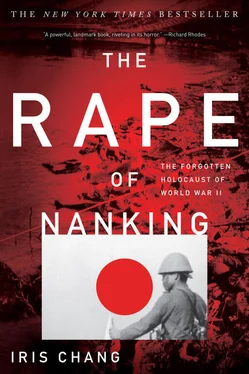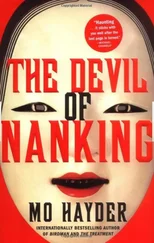So on August 15, when she heard a second signal, Chang took notice. But her friends in the house convinced her that it was just another practice, and so she again went back to bed, until she heard a dull rumbling sound, like that of a cannon. “Oh, it is thunder,” one friend said and went back to reading her novel. Chang returned to bed, ashamed of being overly excited, until she heard the unmistakable sounds of machine-gun fire and airplanes overhead. Nanking was experiencing its first aerial bombardment in history.
For the next few months Nanking would endure dozens of Japanese air raids, forcing residents to hide in basements, trenches, and dugouts in the ground. Japanese pilots bombed the capital indiscriminately, hitting schools, hospitals, power plants, and government buildings and prompting thousands of people both rich and poor to flee the city.
Frank Xing, now a practitioner of Oriental medicine in San Francisco, recalls the hectic, nightmarish conditions under which he and his parents left Nanking during the autumn of 1937. Then a boy of eleven, he packed his precious collection of slingshots and marbles for the journey while his grandmother gave his father, a railway mechanic, bracelets of jade and silver to pawn in the event of future emergency. The train that bore his family to Hankow was so packed that hundreds of refugees unable to get seats sat on top of the compartments, while others also unable to get seats literally strapped themselves underneath the train, their bodies hanging only inches above the tracks. Throughout the journey Xing heard rumors that people had fallen off the train or rolled under the wheels. Xing himself barely survived the trip when Japanese bombers attacked the train, forcing his family to jump out and hide in a cemetery.
My own grandparents nearly separated forever during the evacuations from Nanking. In the autumn of 1937 my grandfather Chang Tien-Chun, a poet and journalist, was working for the Chinese government to instruct officials in Nationalist Party philosophy. The Japanese bombardment of the capital forced him and his family to hide repeatedly in ditches covered by wooden planks and sandbags. By October he had decided it was unsafe for my grandmother (then a pregnant young woman in her early twenties) and my aunt (a one-year-old infant) to remain in Nanking. Both returned to my grandmother’s home village in the countryside, a village near Ihsing, a city on the banks of Tai Hu Lake, between Nanking and Shanghai.
In November, on the anniversary of Sun Yat-sen’s death, my grandfather left the city to see his wife and family. Returning to Nanking just a few days later, he found his entire work unit busy packing up in preparation for their evacuation from the city. Told that provisions had been made for the unit to leave by ship from the city of Wuhu, on the banks of the Yangtze River, my grandfather sent word to his family to meet him there immediately.
They almost didn’t make it. With aerial bombing, the Japanese had destroyed the railway tracks between my grandmother’s village and the city of Wuhu; the only route was by sampan through the intricate network of tiny waterways that laced the entire region.
For four long days my grandfather waited anxiously at the docks scanning boatload after boatload of war refugees. By the fourth day his family still had not arrived, leaving him with a choice that no man should ever be forced to make: board the next and final boat out of Wuhu, in the belief that his wife and daughter were not on their way to Nanking, or stay, in case they were, knowing full well that shortly thereafter the city would be overrun.
In despair, he screamed his beloved’s name—“Yi-Pei! ”—to the heavens. Then, like an echo from far away, he heard a reply. It came from one last sampan approaching the docks in the distance, a tiny sampan bearing his wife, his daughter, and several of my grandmother’s relatives. My mother always told me that their reunion was a miracle.

Unlike my grandparents, many residents of Nanking remained in the city through much of November, some choosing to take a wait-and-see attitude, others staying because they were too old or too poor to do anything else. For them November brought consistently bad news—the battle had not gone well in Shanghai. Long files of Chinese soldiers, many of them mere boys, some no older than twelve, were returning from the battlefront, exhausted, wounded, and demoralized, marching in grim silence or riding in huge trucks draped with the banners of the Red Cross. Those who could took solace from the fact that new units of heavily armed troops could be seen marching through the streets to the waterfront, where they boarded junks towed by tugs on their way to the battlefront. Obviously, the fight was not over. Through rain and howling wind, small modern Chinese tanks rumbled from the capital toward Shanghai, next to lines of pack mules weighed down with cotton uniforms, blankets, rifles, and machine guns.
Later that month the dreaded news finally reached Nanking. Shanghai—“the New York City of China”—had fallen. More than two hundred thousand Japanese troops now stood between the ocean and the capital while some seven hundred thousand Chinese troops fell back in retreat. They brought the news no one wanted to hear. With Shanghai in ruins, the Japanese were now headed for Nanking.
The loss of Shanghai came as a blow to Chiang Kai-shek, the leader of the Nationalists. Faced with the loss of China’s largest metropolis, Chiang tried to resolve a difficult dilemma: whether to defend Nanking against the Japanese or move the entire capital to safer ground. In the end the Generalissimo decided to do both. But rather than stay and defend Nanking himself, he shifted the burden to someone else—a subordinate called Tang Sheng-chih.
The relationship between Chiang and Tang Sheng-chih was strange and highly complex. Neither really trusted the other—indeed, at different points in their lives the two men had been partners as well as the deadliest of rivals. During the Northern Expedition, for example, as the Nationalists tried to unite the country, Tang helped Chiang wage battle against feudal warlords. But Tang had never shown Chiang any particular loyalty, and power struggles between the two men resulted twice in Tang’s exile from China—once to Hong Kong and then again to Japan. In 1931, however, when the crisis erupted between the Chinese and Japanese over Manchuria, Chiang summoned Tang back into service in an effort to strengthen Chinese defenses. Tang rose swiftly through the Chinese military hierarchy, and by 1937 he had become Chiang’s director of military training.
In November 1937, during several high-level military conferences on the issue of defending or abandoning Nanking, Tang, virtually alone among Chiang’s advisers, spoke up in support of providing a strong defense. By defending Nanking, he argued, Chinese troops could simultaneously slow the advance of the Japanese army and give the rest of the Chinese military a chance to rest and reorganize.
But when Chiang asked who would stay and lead the defense, Tang and the other officials were quiet. Singling Tang out, Chiang presented him with an ultimatum: “Either I stay or you stay.” In the presence of his peers, Tang undoubtedly felt he had no choice. “How can we let the Generalissimo stay?” Tang asked. He promised that he would remain in Nanking and fight to the death.
The decision to entrust Tang with the defense of Nanking made big news. On November 27, Tang gave a press conference to boost morale. Before reporters he delivered a rousing speech—vowing to live or die with Nanking. His speech was so passionate that when it ended, reporters gave him a big round of applause.
Читать дальше












